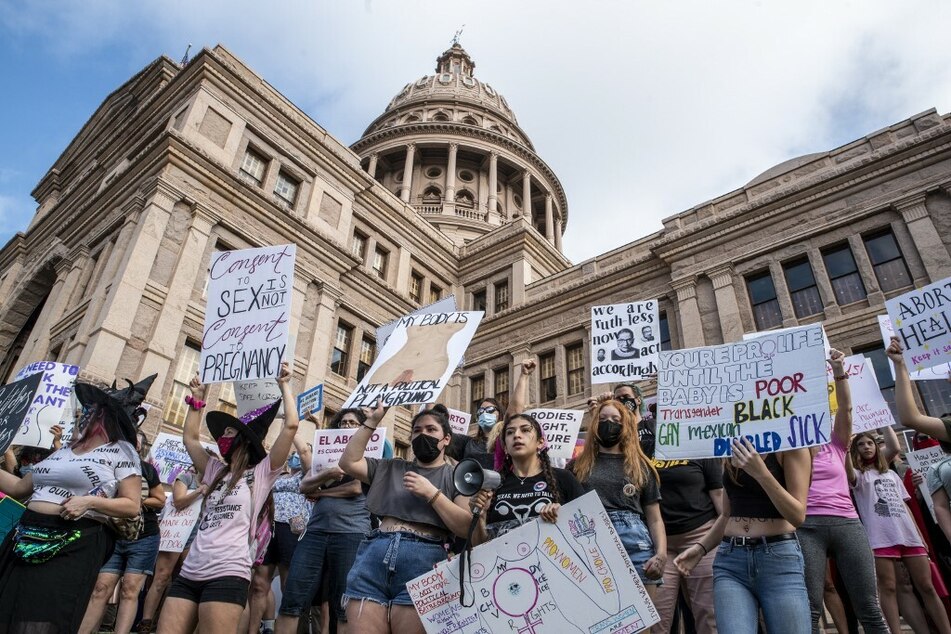Roe v. Wade: What happens if the landmark Supreme Court ruling is overturned?
Washington DC - A draft opinion leaked this week shows that conservative Supreme Court justices could soon overturn the 1973 Roe v. Wade decision that effectively guarantees a woman's right to abortion, but what does this mean for the US going forward? Here are the most important questions and what we know at the moment.
Haven't states already restricted abortion access?

No state has completely banned abortion, though some have recently come close.
Texas enacted its "fetal heartbeat" law last fall that makes abortion illegal after the detection of cardiac fetal activity, which occurs around six weeks – before many women even know they are pregnant.
The strictest abortion legislation in more than 50 years, the Texas law was also the first abortion restriction not to rely on state penalties for enforcement. Instead, the state's Republican-controlled government has created a sick bounty system that allows any member of the public to sue anyone who performs or facilitates an abortion for at least $10,000 per procedure, plus court costs. The law makes no exception for rape or incest.
The Oklahoma legislature approved a similar law last month and Governor Kevin Stitt, a Republican, has indicated he plans to sign it.
The governor recently signed a separate law that outlaws abortion except to save the life of a pregnant woman and makes the procedure a felony punishable by up to 10 years in prison and a $100,000 fine. That law is set to take effect in late August. Experts say it is unlikely to survive a court challenge unless Roe v. Wade is struck down.
Without protections afforded by Roe v. Wade, the landscape could soon start to look a lot worse.
How many more states could ban abortion if Roe v. Wade is overturned?
The Guttmacher Institute, an abortion rights advocacy group, predicts that bans would be imposed in at least 26 states, including 13 that have "trigger laws" set to take effect immediately should the constitutional right to abortion be abolished.
Those bans would eliminate access to abortion for large swaths of the Deep South, Midwest, and West – including Arizona, Idaho, and Utah – creating areas that reproductive rights advocates refer to as "abortion deserts."
That means that women across large swaths of the country may be deprived of access to essential and life-saving health care.
What about abortion medication?
States have increasingly restricted the availability of abortion medication, which now accounts for more than half of all US abortions.
At least 32 states require it be administered by a physician, and 19 have mandated that the clinician providing medication abortion must be physically present, effectively prohibiting telemedicine.
Two states – Indiana and Texas – prohibit its use after a specific point in pregnancy.
The Texas law, passed last year, also does not allow for the drugs to be shipped by mail, though it is unclear how that can be enforced.
Can't people just travel to clinics in California or other states?

Reproductive rights advocates are clear: overturning Roe v. Wade will not impact all women the same way.
Those with the financial capital to travel to another state or country will still have access to abortions.
But working women and women of color, many of whom do not have this same degree of financial flexibility, will be disproportionately harmed by restrictive abortion laws.
For people who can go out of state, experts predict that the fall of Roe v. Wade would increase the distance they have to travel, the overall cost of their abortions, and the workload for clinics.
Clinics in states bordering Texas have been overwhelmed in recent months by out-of-state patients seeking abortions, and the crush is likely to get worse once the new Oklahoma law takes effect.
Given scheduling delays and added travel, providers expect to see patients arriving later in their pregnancies, which could further limit which clinics can treat them.
Many so-called "haven states," including California, limit abortions in the later stages of pregnancy. Those are extremely rare, but if the lack of access to abortions at home translates to big delays, more women would have to turn to the six states, along with Washington DC, that impose no gestational limits. Clinics in at least two of those states – Colorado and New Mexico – have already seen an uptick in patients due to abortion restrictions in Texas.
If access to safe abortion procedures becomes even more difficult, health experts fear that many women could turn to increasingly dangerous means of ending their pregnancies – or be forced to face the risk of carrying life-threatening pregnancies to term.
Cover photo: STEFANI REYNOLDS / AFP

